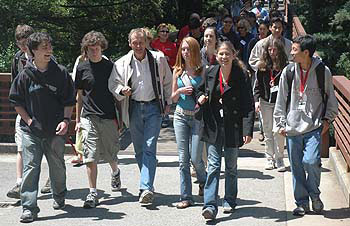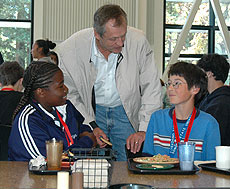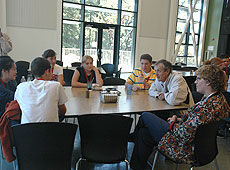July 11, 2005

UC President Dynes pays a visit to UCSC
By Jennifer McNulty
During a recent visit to UCSC, UC President Robert C. Dynes told a group of high school math and science students about the thrill of discovery he felt as a graduate student in physics.

UC President Robert C. Dynes walked from Science Hill with
COSMOS students, top photo, to the College Nine/College
Ten dining hall, where he talked with COSMOS students including
Seana McNamara of Los Altos and Terry Drinkwater of Belmont,
center photo. He and UCSC Chancellor Denice D. Denton chatted
with another group of students, below.
Photos: Louise Donahue |
 |
"I was measuring the energy gap of this particular superconductor. It was the first time it had ever been measured," recalled Dynes, describing an experiment he conducted late one freezing February night in Hamilton, Ontario. "I was walking home, and I realized I knew something that nobody else in the world knew. That was the most unbelievable experience I have ever had. I didn't even hear the snow crunch under my feet."
Encouraging the crowd to continue their studies, Dynes told the students, "I truly wish I were in your shoes. Not only because you're 15 years old, but because I have a sense of what's in front of you--the joy you're going to experience as you grow physically and intellectually."
Dynes visited UCSC during a two-day tour of the Central Coast region. On June 30, he attended a reception at the Steinbeck Center in Salinas with about 125 UC alumni and a dinner with about 60 representatives of business, politics, and education. At UCSC, Dynes and UCSC Chancellor Denice D. Denton got a firsthand look at UC's California State Summer School in Mathematics and Science, known as COSMOS, a four-week residential program for talented high school students across the state. In its sixth year, COSMOS began at UCSC and UC Irvine and is now offered by UC Davis and the San Diego campus as well.
Dynes and Denton joined about 16 students for a lesson about Einstein's theory of relativity before having lunch with the group of nearly 150 COSMOS students and their instructors. After lunch, they visited an engineering class offered to participants in the robotics cluster.
"I had none of the opportunities you are having," Dynes told the crowd during lunch.
Denton, an electrical engineer, told the students that she participated in a Rice University engineering program during the summer before ninth grade. "That made a really big difference to me," said Denton, describing her interactions with faculty, graduate students, and other young people. "It set me on my path to majoring in electrical engineering."
Denton and Dynes encouraged the students to attend the university when they're ready. COSMOS enrolls students who will be entering the ninth through 12th grades in the fall.
"We truly believe you represent the future of the University of California," said Denton. "You will be the leaders of math, science, and engineering. We want to see you at one of our campuses."
Nearly half the participants are the first in their family to attend college, according to a 2003 survey of COSMOS alumni, and COSMOS has attracted significant funding from outside sources, including industry. UCSC's program seeks to enroll a large number of students from groups that are traditionally underrepresented on UC campuses, said Carrol Moran, director of UCSC's Educational Partnership Center, which administers COSMOS. Participants develop close bonds, and many alumni gather for reunions, she said.
"Every year, we get a lot of letters from parents, telling us how happy their children were to find other kids like them," said Moran. "So many kids tell us how great it is to meet other kids who want to talk about physics during lunch."
 Email this story
Email this story
 Printer-friendly version
Printer-friendly version
 Return to Front Page
Return to Front Page